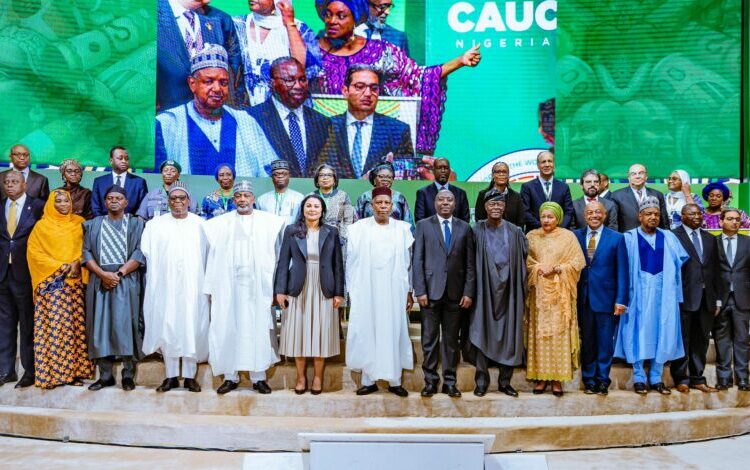Ministers of finance and central bank governors from 50 African countries under the group of African Caucus ’24 have underlined four key pathways to boosting intra-African trade for the development of the region that is largely impoverished and underdeveloped.
In a communique that was issued at the end of its 3-day inaugural meeting in Abuja, the caucus said for the continent to grow, it has to prioritise the strengthening of Pan-African payment ecosystem, enhancing energy access, affordability, and connectivity; leveraging partnerships with MDBs, and reforming global financial architecture.
The Caucus also called on the IMF and World Bank Group to ensure that their support to member countries continues to be guided by principles of balance and evenhandedness, consistent with their policies. These considerations are all the more important at a time when countries are being assailed by adverse exogenous shocks and facing immense financing needs.
The theme for the 2024 Caucus Meeting ‘Facilitating Intra-African Trade: Catalyst for Sustainable Development in Africa’ identified major drivers for growth and development across the continent.
The meeting recognized the importance of intra-African trade in unlocking production, investments, and jobs in Africa. The participants expressed concern that African countries continue to trade with the rest of the world more than among themselves.
The Caucus agreed that addressing both tariff and non-tariff barriers to intra-African trade — including fragmented payment ecosystems, poor energy access, lack of infrastructure, inconsistent regulatory frameworks, and divergent cross-border procedures — was critical to bolstering Africa’s share of global trade and stimulating sustainable and inclusive growth in the continent.
The central bank governors and ministers of finance underscored the point that trade could stimulate economic growth by creating opportunities for increased production, investment, and job creation. They said it would provide access to larger markets, new technologies, and capital. The African Continental Free Trade Area (AfCFTA) aims to promote trade among African countries by reducing trade barriers, harmonising regulations, and facilitating the movement of goods and services within the continent.
The meeting was held in person and attracted ministers and governors of central banks from 50 African Countries and other panellists from beyond, including the director-general of the World Trade Organisation, Ngozi Okonjo-Iweala, deputy secretary general of the United Nations, Mrs Amina Mohammed; secretary general of the African Continental Free Trade Area (AfCFTA), Wamkele Keabetswe Mene; Lord Paul Boateng of the UK House of Lords who was the keynote speaker, members of Nigeria’s federal executive council, as well as country delegates from across Africa and beyond, including representatives from the Bretton Woods Institutions.
The gathering took place amid a synchronised global economic slowdown, with global GDP growth decelerating due to monetary tightening in developing countries and disruptions in global supply chains, exacerbated by geopolitical tensions, including the Ukraine and Palestinian crises. These factors further strain development prospects. Despite Africa’s remarkable resilience, evidenced by its GDP growth, intra-African trade remains relatively low, accounting for only about 14.4 per cent of total African exports.
The Caucus reiterated the call on heads of states to donor countries for an ambitious and robust IDA21 replenishment at a $120 billion target to combat persistent and emerging challenges such as climate change, food insecurity, energy deficit, and fragility.
The African Caucus was established in 1963 to strengthen the voice of African Governors to the issues of mutual interest for Africa. Membership of the Caucus is open to all African countries that are members of the African Union (AU). Currently, all 54 African countries are members of the IMF and WBG.
The countries are represented by their respective ministers of Finance and governors of the Central Bank or by other officials designated as such by the governments. They are called African Governors for the IMF and the WBG.











